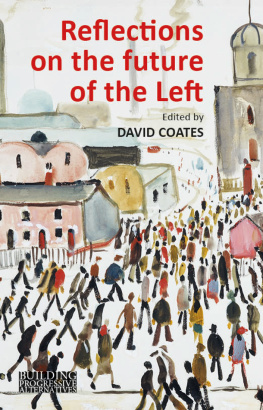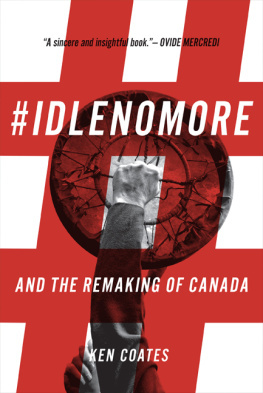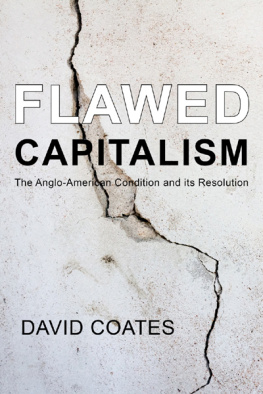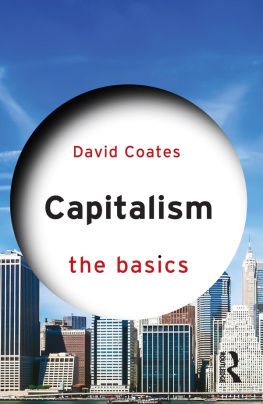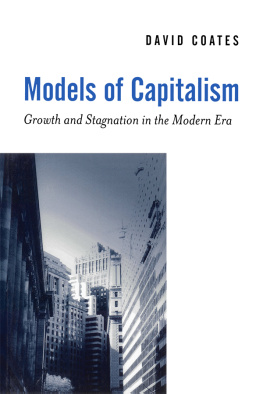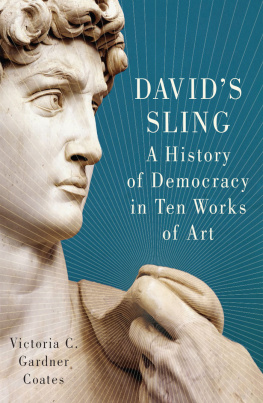Building Progressive Alternatives
Series Editors: David Coates and Matthew Watson
Bringing together economists, political economists and other social scientists, this series offers pathways to a coherent, credible and progressive economic growth strategy which, when accompanied by an associated set of wider public policies, can inspire and underpin the revival of a successful centre-left politics in advanced capitalist societies.
David Coates
Flawed Capitalism: The Anglo-American Condition and its Resolution
David Coates (editor)
Reflections on the Future of the Left
Robbie Shilliam
The Deserving Poor: Colonial Genealogies from Abolition to Brexit
2017 David Coates; individual chapters, the contributors
Chapter 8 originally published in Socialist Register 2017 and reproduced here with permission.
This book is copyright under the Berne Convention.
No reproduction without permission.
All rights reserved.
First published in 2017 by Agenda Publishing
Agenda Publishing Limited
The Core
Science Central
Bath Lane
Newcastle upon Tyne
NE4 5TF
www.agendapub.com
ISBN 978-1-911116-51-6 (hardcover)
ISBN 978-1-911116-52-3 (paperback)
eISBN 978-1-788210-94-2
British Library Cataloguing-in-Publication Data
A catalogue record for this book is available from the British Library
Typeset by JS Typesetting Ltd, Porthcawl, Mid Glamorgan
Printed and bound in the UK by CPI Group (UK) Ltd, Croydon, CRO 4YY
CONTRIBUTORS
Dean Baker co-founded the Center for Economic Policy Research in 1999. His areas of research include housing and macroeconomics, intellectual property, social security, medicare and European labour markets. He is the author of several books, including Rigged: How Globalization and the Rules of the Modern Economy Were Structured to Make the Rich Richer (2016); Getting Back to Full Employment: A Better Bargain for Working People (with Jared Bernstein) (2013); The End of Loser Liberalism: Making Markets Progressive (2011); The United States Since 1980 (2007), and Social Security: The Phony Crisis (with Mark Weisbrot) (2001).
Fred Block is Research Professor of Sociology at the University of California, Davis. His most recent books are The Power of Market Fundamentalism: Karl Polanyis Critique (with Margaret R. Somers) (2016), and a coedited book (with Matthew R. Keller), State of Innovation: The US Governments Role in Technology Development (2011). He has served on the editorial board of Politics & Society since 1980.
David Coates holds the Worrell Chair in Anglo-American Studies at Wake Forest University, North Carolina. He has published extensively on UK and US political economy, labour politics and public policy. His latest publications include America in the Shadow of Empires (2014), Capitalism: The Basics (2016), Observing Obama in Real Time (2017) and Flawed Capitalism: The Anglo-American Condition and Its Resolution (2018).
Colin Crouch is Professor Emeritus at the University of Warwick and an external scientific member of the Max Planck Institute for the Study of Societies at Cologne. He is vice-president for social sciences of the British Academy. He has published within the fields of comparative European sociology and industrial relations, economic sociology, and contemporary issues in British and European politics. His most recent books include Post-Democracy (2004); Capitalist Diversity and Change: Recombinant Governance and Institutional Entrepreneurs (2005); The Strange Non-death of Neoliberalism (2011); Making Capitalism Fit for Society (2013); Governing Social Risks in Post-Crisis Europe (2015); The Knowledge Corrupters: Hidden Consequences of the Financial Takeover of Public Life (2015) and Society and Social Change in 21st Century Europe (2016).
Sam Gindin , now retired, spent most of his working life on the staff of the Canadian Auto Workers union (now UNIFOR) where he was Research Director and later Assistant to the President. He subsequently (200010) held the Visiting Packer Chair in Social Justice in the Political Science Department at York University, Toronto. He has written extensively on labour issues and co-authored, with Leo Panitch, The Making of Global Capitalism: The Political Economy of American Empire (2012).
Leo Panitch is Emeritus Distinguished Research Professor of Political Science at York University, Toronto. He has been editor of the annual international volume Socialist Register for over three decades. Among his many books are: Renewing Socialism: Transforming Democracy, Strategy and Imagination (2009); The End of Parliamentary Socialism: From New Left to New Labour (2001) and In and Out of Crisis: The Global Financial Meltdown and Left Alternatives (2010). His most recent book, The Making of Global Capitalism: The Political Economy of American Empire (with Sam Gindin), was awarded the Deutscher book prize in the UK and the Davidson book prize in Canada.
Wolfgang Streeck is Director Emeritus and Professor at the Max Planck Institute for the Study of Societies in Cologne. From 1988 to 1995 he was Professor of Sociology and Industrial Relations at the University of Wisconsin-Madison. His latest publications include: How will Capitalism End? Essays on a Failing System (2016); Buying Time: The Delayed Crisis of Democratic Capitalism (2014); Politics in the Age of Austerity (coeditor with Armin Schfer) (2013) and Re-Forming Capitalism: Institutional Change in the German Political Economy (2009). His current research interests are crises and institutional change in the political economy of contemporary capitalism.
Hilary Wainwright is a researcher and writer on forms of popular democracy, a Fellow of the Transnational Institute (New politics project) and founder editor of Red Pepper magazine www.redpepper.co.uk. A long-time activist on the UK Left, she is the author of, among other books, Reclaim the State: Experiments in Popular Democracy (2009); Arguments for a New Left (1994) and Labour: A Tale of Two Parties (1987). She is co-author, with Sheila Rowbotham and Lynne Segal, of Beyond the Fragments: Feminism and the Making of Socialism (1979 & 2012) and with Dave Elliot The Lucas Plan: A New Trade Unionism in the Making (1981). Her latest (forthcoming) book is A New Politics from the Left .
Matthew Watson is Professor of Political Economy in the Department of Politics and International Studies at the University of Warwick. He is also currently a UK Economic and Social Research Council Professorial Fellow. He writes explicitly political studies of the history of economic thought, and sets the concepts that today continue to dominate discussions of the economy back in the historical context in which they were first developed. His single-authored books are Foundations of International Political Economy (2005); The Political Economy of International Capital Mobility (2007); Uneconomic Economics and the Crisis of the Model World (2014) and The Market (2017).


